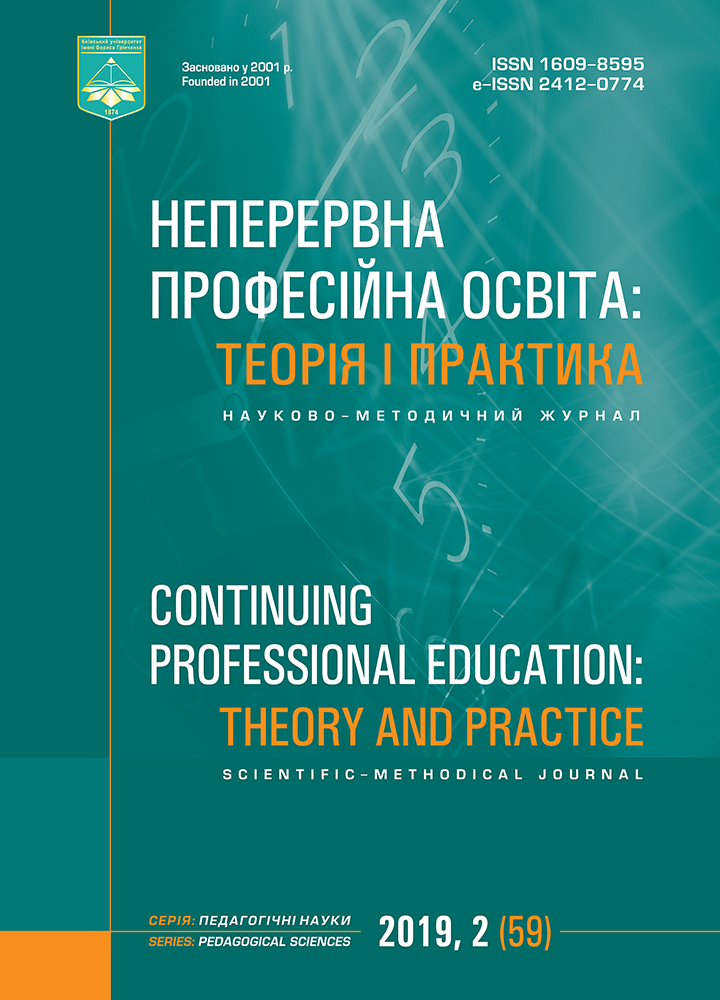THE ROLE OF EDUCATIONAL ASSOCIATIONS OF 1911-1914 YEARS TO SOLVE THE TEARCHERS’ PROBLEM
DOI:
https://doi.org/10.28925/1609-8595.2019.2.2227Keywords:
financial and legal status of teachers, pedagogical congress, pedagogical course, pedagogy, teachers’ professional development.Abstract
The article deals with the issues of preparation and retraining of teachers, as well as the problems of their financial and legal status, which became the subject of consideration of the pedagogical congresses of 1911– 1914. The study identifies ways to address these issues that were proposed by participants in educational congresses. There is a gradual democratization of education, a revision of the requirements for vocational training and retraining of teachers, their status, national and religious characteristics, and political preferences. The preconditions of scientific approach to pedagogy and necessity of university pedagogical education are considered. The study of the pedagogical congresses of 1911–1914 allows to argue that during this period, educators were deeply concerned about the problems of teaching: the issues of teacher training and retraining, their financial and legal status, as well as during this period, there were first attempts to democratize education and attitudes toward teachers: the issue of the abolition of restrictions on national and religious grounds was discussed, conditions for the admission and dismissal of teachers were prescribed, commissions were created that objectively examine each case and listen to the explanations of the teacher, who was accused of something. One of the characteristics of that period was the transition to a scientific approach to pedagogy and the justification of the need for university teaching education. It should be noted that many of the issues that were considered during the congresses of the mentioned period remain relevant even in the 21st century. Among the prospects for further research, we can mention the consideration of these issues in the dynamics during the next pedagogical congresses and the implementation of decisions taken at these congresses and their influence on the development of education in our country.References
Dnevnik Pervogo Vserossiyskogo syezda po voprosam narodnogo obrazovaniia (1913). [Diary of the First All-Russian Congress on People’s Education], 1, 22 December 1913. Saint Petersburg, Russia: Tipografiia Rodnin (rus).
Doklady, prenia, postanovlenia vtoroy sektsii Pervogo Vserossiyskogo syezda po voprosam narodnogo obrazovaniia [Reports and Drafts of the First All-Russian Congress on People’s Education] (1915) / pod red. Organizatsionnogo Komiteta Syezda [Organisation Committee of the Congress]. Petrograd, Russia (rus).
Doklady, prenia, postanovlenia vtoroy sektsii Pervogo Vserossiyskogo syezda po voprosam narodnogo obrazovaniia [Reports and Drafts of the First All-Russian Congress on People’s Education] (1916) / pod red. Organizatsionnogo Komiteta Syezda [Organisation Committee of the Congress]. Petrograd, Russia, 4 (rus).
Pervyy Obshchezemsky Syezd po Narodnomu obrazovaniyu 1911 goda: Doklady [The First All-Zemstvo Congress on People’s Education] (1911). Moscow, Russia: Pechatnya S. P. Yakovlev, Vol. 1 (rus).
Pervyy Obshchezemsky Syezd po Narodnomu obrazovaniyu 1911 goda: Doklady [The First All-Zemstvo Congress on People’s Education] (1912). Moscow, Russia: Tipografiia Vilde, Vol. 2 (rus.)
Trudy Vtorogo Vserossiyskogo Syezda im. K. D. Ushinskogo [Works of the Second All-Russian Konstantyn Ushinsky Congress] (1914–1915). Saint-Petersburg, Russia: Ispolnitelnaya finansovaya komisciya, 1 (rus.) Anderson, T. (2003). Getting the Mix Right Again: An Updated and Theoretical Rationale for Interaction.
The International Review of Research in Open and Distributed Learning, 4 (2), 1–14. DOI: http://dx.doi. org/10.19173/irrodl.v4i2.149 (eng.)
Downloads
How to Cite
Issue
Section
License
Copyright (c) 2020 Iryna Didenko, Olena Filatova

This work is licensed under a Creative Commons Attribution-NonCommercial 3.0 Unported License.



